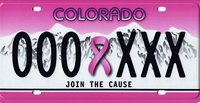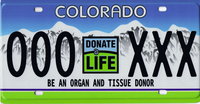By Jery Payne
Editor’s note: This article is an update to “So You Want A New Special License Plate,” posted September 15, 2011.
An issue emerged during the 2014 legislative session. Some legislators — of both parties — began to question whether fund-raising special license plates violate section 25 of article V of the Colorado Constitution:
Section 25. Special legislation prohibited. The general assembly shall not pass local or special laws in any of the following enumerated cases, that is to say; … granting to any corporation, association or individual any special or exclusive privilege, immunity or franchise whatever. …
This prohibits something that is commonly called “special legislation,” which is legislation that gives a named person or group a special right that other groups don’t have. Now, laws reward and punish people all the time, but the law is considered fair if people have an opportunity to enter or exit the rewarded or punished group. For example, people who graduate from medical school are eligible for the reward of a license to practice medicine. Although not everybody can get into medical school, the law doesn’t make that decision, so we say that the group isn’t closed. It’s up to the person to figure out how to get into the group. Imagine, if instead, doctors were licensed  only by being named in a bill. A lot of medical-school graduates might never be licensed, so we would say the group is closed.
only by being named in a bill. A lot of medical-school graduates might never be licensed, so we would say the group is closed.
Arguably, fund-raising special license plates violate the rule against special legislation. Most of these plates require a person to make a donation to a group — usually a charity — before the state will issue the plate. In return, the charity gives the donor a receipt. To get the plate, a person must show this receipt. Otherwise, the state won’t issue the plate.
The issue is that the statute typically names a specific group. Other charities might help the same folks and have the same qualifications, but they can’t receive plate donations unless they get a bill passed also.
Originally, legislators tried to avoid this issue by not having the state collect the money. But other legislators began to question whether this really avoids the issue. The group is still closed, they argue, so it doesn’t matter if the state touches the money.
the state touches the money.
Now, we don’t actually have any case law that deals specifically with this issue. So until a court rules on this issue, we can’t be sure if these plate statutes would be overturned. But quite a few legislators have said they will vote against any license-plate bill that specifically names a group.
There is, however, a way to avoid this issue altogether: Don’t name the group. Instead, describe the characteristics that make the group deserving of donations. This approach was used last year in House Bill 15-1313 to describe a group that is dedicated to helping the Rocky Mountain National Park:
42-3-249. Special plate – Rocky Mountain National Park. (3) (a) At least once every five years, the department shall designate an organization to qualify applicants to be issued the Rocky Mountain National Park license plate. The organization must:
(I) Be based in Colorado;
(II) Have been in existence for at least ten years;
(III) Manage a conservation program for the benefit of the park;
(IV) Help promote the stewardship of the park;
(V) Fund trail building and maintenance within the park;
(VI) Provide interns or volunteers to staff visitor centers or deliver education programs to visitors; and
(VII) Have provided at least five hundred thousand dollars’ worth of support annually to the park for the last five years.
This approach may avoid trouble.
